小学六年级下册unit4
新版小学pep六年级下册英语unit4教案

新版小学pep六年级下册英语unit4教案Unit4Thenandnow单元教学目标能力目标:1.学习描述过去和现在不同的句dininghall,gra,gym,ago,cycling,gocycling,ice-kating,badminton.3.能听、说、认读单词或词组:tar,eay,lookup,Internet,different,active,race,nothing,tho ught,felt,cheetah,rip,woke,dream.4.会唱歌曲《Changeinme》。
知识目标1.能听懂、会说PartA、B中Let’talk,Let’learn中呈现的对话,并能在实际中得以运用。
2.能听、说、人读三会单词或词组tar,eay,lookup,Internet,different,active,race,nothing,though t,felt,cheetah,trip,woke,dream,四会单词或词组:dininghall,gra,gym,ago,cycling,gocycling,ice-kating,badminton.1.通过对比过去和现在的生活,培养学生热爱生活、珍惜幸福的优秀品质。
2.通过对比过去和现在的生活方式和环境,培养学生保护环境的意识。
3.通过唱歌,提高学生的节奏感。
课时划分6课时第一课时A.Let’learnA.Findthemitake第二课时A.Let’tryA.Let’talk第三课时B.Let’learnB.L iten,match,anday第四课时B.Let’tryB.Let’talk第五课时B.Readandwrite第一课时ALet’learn&Findthemitake一、教学目标与要求:1.能够听、说、读、写以下七个单词和词组:dininghall,gra,gym,ago,year,month,lat。
2.能够正确运用上述七个单词和词组谈论或描述过去到现在发生的变化。
Unit4Roadsafety(单元解读)六年级英语下册(译林版三起)
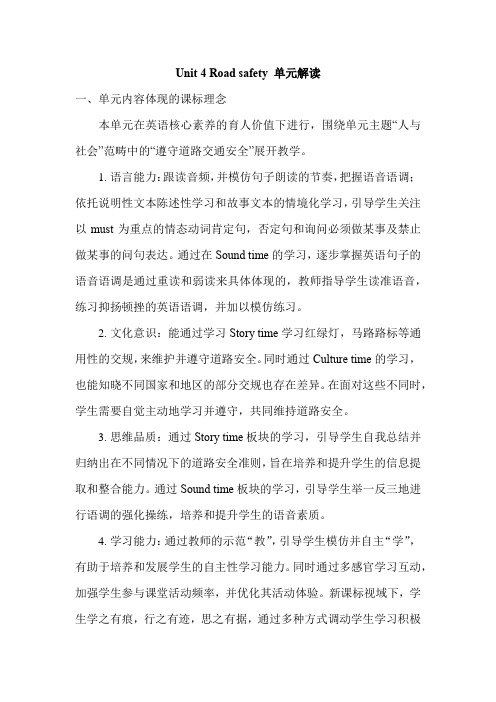
Unit 4 Road safety 单元解读一、单元内容体现的课标理念本单元在英语核心素养的育人价值下进行,围绕单元主题“人与社会”范畴中的“遵守道路交通安全”展开教学。
1.语言能力:跟读音频,并模仿句子朗读的节奏,把握语音语调;依托说明性文本陈述性学习和故事文本的情境化学习,引导学生关注以must为重点的情态动词肯定句,否定句和询问必须做某事及禁止做某事的问句表达。
通过在Sound time的学习,逐步掌握英语句子的语音语调是通过重读和弱读来具体体现的,教师指导学生读准语音,练习抑扬顿挫的英语语调,并加以模仿练习。
2.文化意识:能通过学习Story time学习红绿灯,马路路标等通用性的交规,来维护并遵守道路安全。
同时通过Culture time的学习,也能知晓不同国家和地区的部分交规也存在差异。
在面对这些不同时,学生需要自觉主动地学习并遵守,共同维持道路安全。
3.思维品质:通过Story time板块的学习,引导学生自我总结并归纳出在不同情况下的道路安全准则,旨在培养和提升学生的信息提取和整合能力。
通过Sound time板块的学习,引导学生举一反三地进行语调的强化操练,培养和提升学生的语音素质。
4.学习能力:通过教师的示范“教”,引导学生模仿并自主“学”,有助于培养和发展学生的自主性学习能力。
同时通过多感官学习互动,加强学生参与课堂活动频率,并优化其活动体验。
新课标视域下,学生学之有痕,行之有迹,思之有据,通过多种方式调动学生学习积极性,提高其随堂学习的效率。
二、单元内知识关联1.单元说明:本单元介绍主要介绍健康的饮食,分别由Story time, Grammar time, Fun time, Sound time, Culture time, Cartoon time, Checkout time &Ticking time.八大板块构成。
第一部分:Story time。
本部分的说明性文本通过两个不同的道路情况,对马路安全准则进行了说明。
小学英语六年级下册Unit 4 Planting trees in good for us

Tick √ ,if you agree.
1. We want more houses because there are more √
people.
2. The Earth is getting hotter and hotter.
√
3. People cut down trees to make more roads. √
“形容词比较级+and+形容词比较级”表示“越 来越……”。
例句:我们的生活正变得越来越美好。 Our life is becoming better and better.
拓展:“the+比较级…the+比较级…”意为 “越……,越……”。
形容词和副词比较级
一、规则变化 1. 一般在词尾直接加er
Let’s Practise
点击画面 播放视频
Let’s Practise
Planting trees is good for us. We should plant more trees.
I will plant trees. I like trees with flowers.
I will water the young trees every day.
on 12th March.
My friends
Yes. Planting tress is fun.
and I enjoy planting trees.
It’s Trees Planting Day today. Planting trees is good for us.
I like to plant fruit trees.
Why should we plant more trees? Trees can keep the air clean. Trees can make the place beautiful. Trees help to make the air cool and fresh. Trees make the Earth clean and green.
人教PEP版六年级下册英语Unit4(课件)
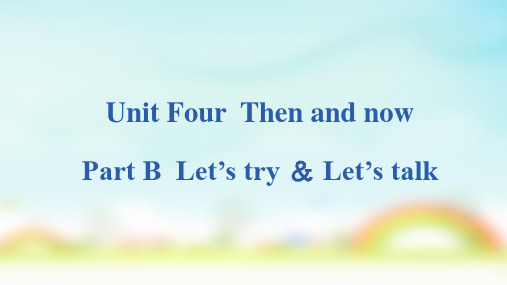
过去与现在的对比。前面是一般过去时,后面是一般现在时。
【句型】 Before,主语 + was/were + 形容词/名词/介词短语 + 表过去时间状语. Now,主语 + am/is/are + 形容词/名词/介词短语 + 表现在时间状语.
John was _sh_o_r_t__ before and couldn’t ride bike well. Now, he _go_e_s___ cycling every day. It’s good _e_x_e_r_c_is_e_.
Let’s talk Work in pairs
Talk about your friends or family members.How did they change?
Unit Four Then and now Part B Let’s try & Let’s talk
Warm-up
I was ห้องสมุดไป่ตู้hort. I was fat.
I was active.
Then Now
I am tall. I am thin. I am quiet.
Let’s try
Mike’s friends are visiting his home. Listen and circle. 1. What are they talking about? A. Mike’s hobby. B. Mike’s old photos. 2. What grade was Mike in? A. Grade 1. B. Grade 5.
六年级英语下册Unit4知识点梳理
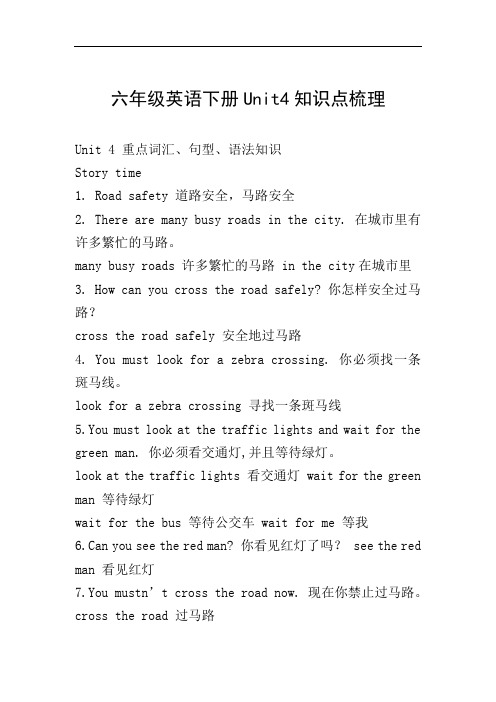
六年级英语下册Unit4知识点梳理Unit 4 重点词汇、句型、语法知识Story time1. Road safety 道路安全,马路安全2. There are many busy roads in the city. 在城市里有许多繁忙的马路。
many busy roads 许多繁忙的马路 in the city在城市里3. How can you cross the road safely? 你怎样安全过马路?cross the road safely 安全地过马路4. You must look for a zebra crossing. 你必须找一条斑马线。
look for a zebra crossing 寻找一条斑马线5.You must look at the traffic lights and wait for the green man. 你必须看交通灯,并且等待绿灯。
look at the traffic lights 看交通灯 wait for the green man 等待绿灯wait for the bus 等待公交车 wait for me 等我6.Can you see the red man? 你看见红灯了吗? see the red man 看见红灯7.You mustn’t cross the road now. 现在你禁止过马路。
cross the road 过马路8.You can cross the road now.你现在可以过马路了。
9. find a zebra crossing near you 在你附近找到斑马线10. To keep safe, you can wait on the pavement and look out for cars and bikes.为保证安全,你可以在人行道上等,并且当心小汽车和自行车。
句首用to表目的,意为“为了……”keep safe = stay safe 保持安全wait on the pavement 在人行道上等待look out for cars and bikes 当心小汽车和自行车look out for 当心,当心11. You must first look left, then right and then left again.你必须先看左边,然后看右边,再看左边。
人教版小学英语六年级下册Unit4短语、知识点辨析归纳
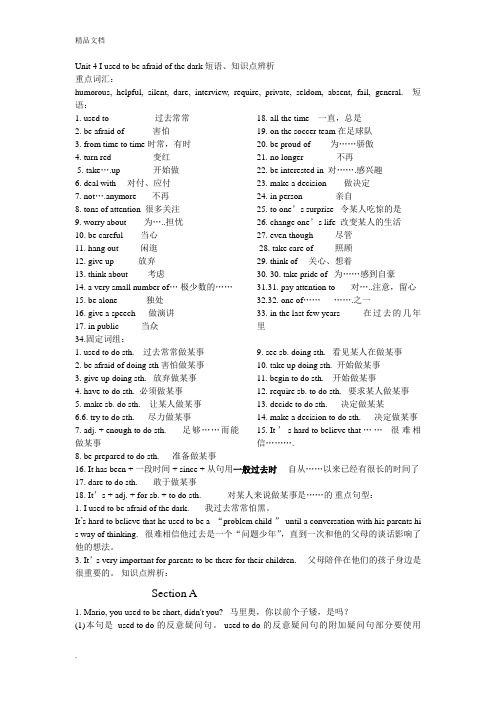
Unit 4 I used to be afraid of the dark 短语、知识点辨析重点词汇:humorous, helpful, silent, dare, interview, require, private, seldom, absent, fail, general. 短语:1. used to 过去常常2. be afraid of 害怕3. from time to time 时常,有时4. turn red 变红5. take….up 开始做6. deal with 对付、应付7. not….anymore 不再8. tons of attention 很多关注9. worry about 为…..担忧10. be careful 当心11. hang out 闲逛12. give up 放弃13. think about 考虑14. a very small number of…极少数的……15. be alone 独处16. give a speech 做演讲17. in public 当众18. all the time 一直,总是19. on the soccer team 在足球队20. be proud of 为……骄傲21. no longer 不再22. be interested in 对…….感兴趣23. make a decision 做决定24. in person 亲自25. to one’s surprise 令某人吃惊的是26. change one’s life 改变某人的生活27. even though 尽管28. take care of 照顾29. think of 关心、想着30. 30. take pride of 为……感到自豪31.31. pay attention to 对…..注意,留心32.32. one of………….之一33. in the last few years 在过去的几年里34.固定词组:1. used to do sth. 过去常常做某事2. be afraid of doing sth害怕做某事3. give up doing sth. 放弃做某事4. have to do sth. 必须做某事5. make sb. do sth. 让某人做某事6.6. try to do sth. 尽力做某事7. adj. + enough to do sth. 足够……而能做某事8. be prepared to do sth. 准备做某事9. see sb. doing sth. 看见某人在做某事10. take up doing sth. 开始做某事11. begin to do sth. 开始做某事12. require sb. to do sth. 要求某人做某事13. decide to do sth. 决定做某某14. make a decision to do sth. 决定做某事15. It’s hard to believe that……很难相信……….16. It has been + 一段时间 + since + 从句用一般过去时自从……以来已经有很长的时间了17. dare to do sth. 敢于做某事18. It’s + adj. + for sb. + to do sth. 对某人来说做某事是……的重点句型:1. I used to be afraid of the dark. 我过去常常怕黑。
新版PEP小学六年级英语下册Unit-4-Then-and-now教案

Unit 4 Then and now教学目标知识与能力目标1. 能够听、说、读、写,并在情景中恰当运用句型以及相关词汇:There was/ were (no) … years ago. Now there is / are ..谈论或描述某个地方的今昔。
2. 能够听、说、读、写,并在情景中运用以下句型以及相关词汇:Before, I / he/ she / it / was… Now , I / he / she / it ……谈论或描述自己、家人以及朋友过去到现在的变化。
3. 能够在语境中理解生词或短语star, easy, look up , Internet 的意思,并能正确发音。
情感态度、文化意识、学习策略目标1.鼓励学生将自己的烦恼、恐惧讲述给父母,释放内心的压力,保持身心健康。
2.能够在语篇中捕捉不同类型的信息,提炼文章的主旨大意,并进行简单的推理。
3.学会上网查询资料,自主学习。
课时安排6课时第一课时教学内容A.Let’s try Let’s talk课型对话教学教学目标1.学生能理解对话大意并能正确朗读所学对话。
2.能在图片的帮助下,在情景中运用There be 句型,用3—5句话描述某个地方过去与现在的状态和变化。
3.能理解one day , look it up, in my time , Internet 的意义和用法,并能正确发音。
4.了解为类首次登月的一些信息。
教学重点能在图片的帮助下,在情景中运用There be 句型,用3—5句话描述某个地方过去与现在的状态和变化。
教学难点能理解one day , look it up, in my time , Internet 的意义和用法,并能正确发音。
教学准备课件、图片教学过程:Step 1: Warm-up1.教师出示图片,复习学校设施单词如:library, computer room, art room……2.教师将单词卡片发给学生,模拟“萝卜蹲”游戏。
pep六年级下册unit_4_Then_and_now_单元课件
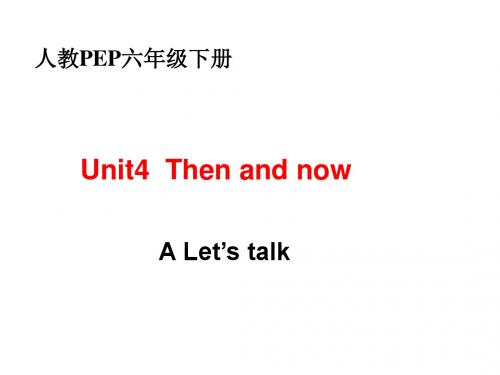
There was no gym in the school twenty years ago. Now there is a new one in the school.
Attention: 注意使用there be句型
What are the differences? There was only one old building in my school twenty years ago.
两人一组试着用简笔分别画画出学校5年前及现在的样子; 画完后,同桌之间相互描述,看谁描述的最准确。
竞聘要求: 讲述学校的过去与现在。
Summary
There was/were (no) … in … years ago. Now there is/are…
Unit 4
Then and now
Part A Let' s learn
你会说下面单词和短语的意思吗?
……years ago ……months ago last dinning year hall month grass gym
Find the mistakes
In the Tang dynasty… At that time, there were no gyms. People didn’t go by bus. People couldn’t use the Internet.
Now, he is a famous basketball player.
Look,she is my baby.
Before , I hadhave short hair .
Then and now
你会说下面单词和短语的意思吗?
……years ago ……months ago last dinning year hall month grass gym
人教版小学英语新起点 六年级下册Unit4 第四单元知识点精析

人教版小学英语新起点六年级下册Unit4 第四单元知识点精析talk about 谈论hockey 曲棍球;冰上曲棍球together 一起special 特殊,特别beaver 海(河)狸raccoon 浣熊moose北美麋;驼鹿重点能够询问某人的爱好是什么能够询问某人过去做了什么难点能够询问某人做某事的频率能够询问某人是否做过某事Lesson 11. What are your hobbies?你的爱好是什么?这是询问某人的爱好是什么的句子。
what s是what is的缩写,your是形容性物主代词,意为“你的”,在这里your 还可以换成名词所有格。
句型结构: What are+形容词性物主代词/名词所有格+ hobbies?例:—What are Tom s hobbies? 汤姆的爱好是什么?—His hobby is collecting stamps. 他的爱好是集邮。
2 .How often do you do them? 你多久做一次运动?这是用来询问做某事的频率的句子。
how often为“多久一次”。
表示频率的短语有once a day,twice a week,three times a year等句型结构:How often + do/does主语+动词(短语)原形+其他?例:How often do you eat fast food? 你多久吃一次快餐?—How often do you play basketball? 你多久打一次篮球?—Twice a week. 一周两次。
3. 辨析how often, how long与how soonhow often多久一次对频率提问how long多久,多长对时间段或物体的长度提问how soon多久以后对“in+时间段"提问,常用于一般将来时的句子中例:—How often does he come here? 他(每隔)多久来这里一次?—Once a month. 每月一次。
pep小学英语六年级下Unit4_Alet's_talk
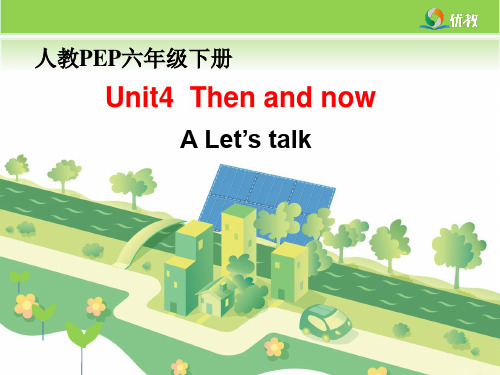
G: Wow, a library! There was no library in my old school.
S: Tell us about your school, please.
G: There was only one small building on a hill. W: Could you see stars at night? G: Yes, I liked the stars. S: Me too. One day I’m going to visit the moon. W: The Americans took about five days to get there in 1969. S: How do you know that? W: Easy, I looked it up on the Internet.
Let’s talk
1.Was there a library in grandpa’s old school? A.Yes, there was a library. B.No, there was no library.
2.How many small buildings were there on the hill?
stars
Can you see the stars during the I can see stars at night. Yes, I / No, I can’t. day?
can.
Do you know the name of this It’s very easy. star?
look up 查阅 Internet
One day, I’m going to visit the moon.
2020人教PEP版英语六年级下册第四单元知识点梳理 附复习要点Unit4 Then and now
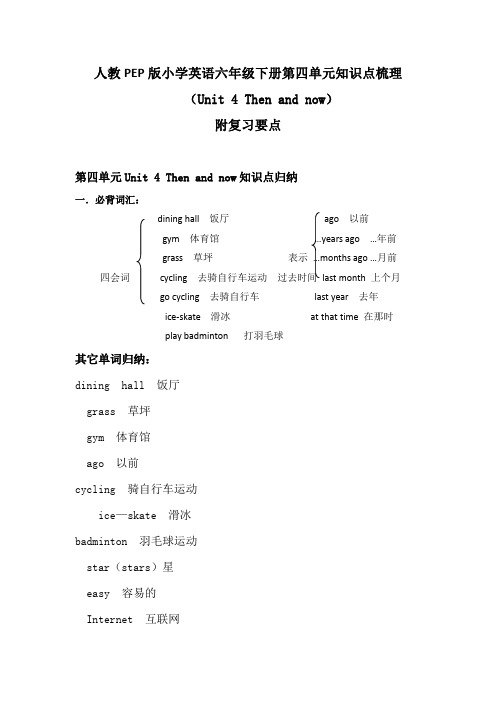
人教PEP版小学英语六年级下册第四单元知识点梳理(Unit4Then and now)附复习要点第四单元Unit4Then and now知识点归纳一.必背词汇:dining hall饭厅ago以前gym体育馆…years ago…年前grass草坪表示…months ago…月前四会词cycling去骑自行车运动过去时间last month上个月go cycling去骑自行车last year去年ice-skate滑冰at that time在那时play badminton打羽毛球其它单词归纳:dining hall饭厅grass草坪gym体育馆ago以前cycling骑自行车运动ice—skate滑冰badminton羽毛球运动star(stars)星easy容易的Internet互联网different(same)不同的(相同的)active积极活跃的;race赛跑nothing没有什么think—thought想feel—felt感觉cheetah猎豹trip绊倒wake—woke醒dream梦star星easy容易的look up查阅Internet互联网different不同的active活跃的race赛跑nothing没有什么thought想felt感觉cheetah猎豹trip绊倒woke醒wake up醒来短语归纳:go cycling去骑自行车play badminton打羽毛球look up查阅last month/year上月/去年at night在晚上play basketball打篮球use the Internet使用互联网wear glasses戴眼镜dream梦win the race赢得比赛have a race with…和…进行一场赛跑一、句子归纳:1、There was no library in my old school.我以前的学校里没有图书馆。
新人教PEP版小学六年级英语下册Unit4Thenandnow单元教学解读

新人教PEP版小学六年级英语下册Unit 4Then and now单元教学解读本单元的主题是谈论人物和事物过去到现在的变化,主要包含Main scene、A、B和C四个部分。
Main scene通过吴斌斌和他的爷爷、爸爸参观校史博物馆的场景呈现了本单元重要句型和部分词汇,让学生对本单元所学知识有一个初步的了解。
A部分包含Let’s try、Let’s talk、Let’s learn和Find the mistakes四个环节。
此部分主要通过吴斌斌的爷爷和孩子们以及吴斌斌的爸爸和吴斌斌交流学校今昔变化的对话、找错游戏等方式,让学生学习用相关单词和句型描述某个地方过去与现在的状态和变化。
B部分包含Let’s try、Let’s talk、Let’s learn、Listen,match and say、Read and write、Let’s check和Let’s wrap it up七个环节。
本部分主要通过三个孩子谈论老照片的场景以及迈克和吴斌斌谈论季节、运动的喜好变化学习用英语描述以前和现在的生活和爱好的变化,并通过短文阅读、听力练习等方式对本单元所学重点知识进行巩固。
C部分只有Story time一个环节,主要通过情景故事帮助学生巩固本单元所学核心语言,同时拓展一些历史、生物方面的知识。
本单元要求学生运用一般现在时和一般过去时来描述过去与现在的变化,看起来似乎难度较大,但是这两种时态学生都已经学过,因此实际难度并不大。
一般现在时态下的there be句型的陈述句和一般疑问句在五年级也已经学过,为本单元的教学奠定了一定的句型基础,教师在教学时要注意以学生为主,以旧知引出新知,提高学生综合运用语言的能力。
本单元的主题贴近学生的实际生活,因此教师要注意教学设计的生活化,同时充分利用教材设定的情景展开活动,鼓励学生收集资料、大胆发言,积极参与教学活动。
1.能够听、说、读、写本单元的四会单词;2.能够听、说、认读本单元的三会单词;3.能够用句型“There was/were no+主语(+其他).”描述过去没有某物;4.能够用句型“Tell+代词宾格(us,you,them,me,him,her)+about+其他.”请求别人给某人讲述关于某方面的信息;5.能够用句型“There was/were+主语(+其他).”描述过去有某物;6.能够用句型“How do/does+主语+know that?”询问他人如何得知某事;7.能够用句型“Before,主语+was/were+形容词/名词.Now,主语+am/is/are+形容词/名词.”描述某人过去和现在的不同;8.能够独立完成本单元相关练习;9.能够理解Story time的故事内容并表演故事;10.能够演唱英文歌曲Changes in me。
苏教译林版英语 六年级下册 Unit 4 Road safety 知识点总结

苏教译林英语六年级下册Unit 4Road safety 知识点一、词汇road 马路,公路safety安全cross穿过,穿行safely 安全地must必须zebra crossing 斑马线safe安全的pavement人行道look out for当心,提防easily容易地follow遵守rule规则stay 保持light灯二、句型及语法1. There are many busy roads in the city. 在城市里有许多繁忙的马路。
①busy意为“繁忙的”;短语:be busy doing sth. / be busy with sth. 忙于做某事例句:I’m busy doing my homework.①many“很多”,修饰可数名词复数;much“许多”,修饰不可数名词。
2. How can you cross them safely? 你怎么才能安全过马路呢?【注】:“How can you …?”是询问对方怎么做某事时的用语,意为“你怎样才能…”。
safely为副词“安全地”,用来修饰动词cross。
疑问副词how的用法:①对方式、手段、方法等进行提问How do you come to school? 你怎样来学校?②表问候How are you? 你好吗?/ How do you feel now? 你现在感觉怎么样?③询问天气How is the weather today? 今天天气怎么样?④询问年龄How old are you? 你多大了?⑤询问可数名词的数量,结构为“how many + 可数名词复数形式”How many books do you have? 你有多少本书?⑥how much询问不可数名词的数量或者询问价钱How much is this sweater? 这件毛衣多少钱?⑦how about用来征求意见How about this one?【注】:safely“安全地”,为副词,副词修饰动词cross。
小学六年级英语下册unit4重点知识归纳

unit4《Then and now》重点知识归纳
【重点词汇】
dining hall饭厅
grass草坪
gym体育馆
ago从前
cycling骑自行车运动
go cycling去骑自行车
ice-skate滑冰
badminton羽毛球运动
【短语】
....year ago(几)年前...months ago(几)个月前
6.I was short , so I couldn’t ride my bike well.我个子矮,所以骑自行车
7. Now I go cycling everyday.现在我每天都去骑自行车。
3.How do you know that?你是怎么知道的?
4.There was no computer or Internet in ቤተ መጻሕፍቲ ባይዱy time .在我的时代没有电脑或互联网。
5.Before , I was quiet. Now I am very active in class.以前,我还很安静。现在我在课堂上很活跃。
last year去年last month上个月
play badminton玩羽毛球
【重点句型】
1.There was no library in my old school.在我的老学校里没有图书馆。
2.Tell us about your school , please.请告诉我们你所在学校的情况。
PEP小学英语六年级下册Unit4单元整体教学设计
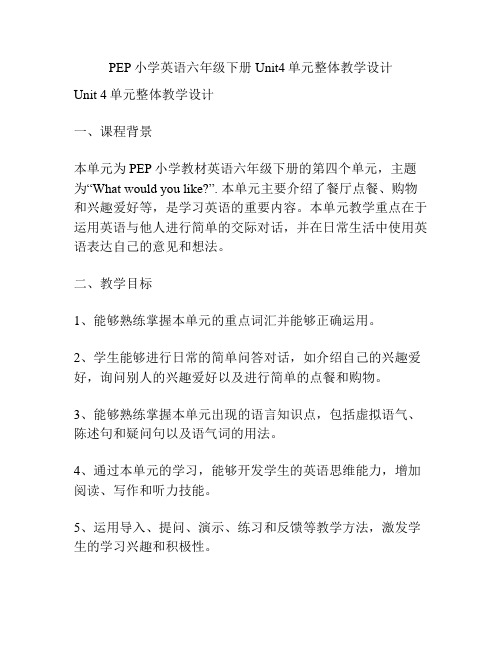
PEP小学英语六年级下册Unit4单元整体教学设计Unit 4单元整体教学设计一、课程背景本单元为PEP小学教材英语六年级下册的第四个单元,主题为“What would you like?”. 本单元主要介绍了餐厅点餐、购物和兴趣爱好等,是学习英语的重要内容。
本单元教学重点在于运用英语与他人进行简单的交际对话,并在日常生活中使用英语表达自己的意见和想法。
二、教学目标1、能够熟练掌握本单元的重点词汇并能够正确运用。
2、学生能够进行日常的简单问答对话,如介绍自己的兴趣爱好,询问别人的兴趣爱好以及进行简单的点餐和购物。
3、能够熟练掌握本单元出现的语言知识点,包括虚拟语气、陈述句和疑问句以及语气词的用法。
4、通过本单元的学习,能够开发学生的英语思维能力,增加阅读、写作和听力技能。
5、运用导入、提问、演示、练习和反馈等教学方法,激发学生的学习兴趣和积极性。
三、教学内容及安排1、New words and expressions.首先,进行新单元单词的学习。
教师可以设计一些语言游戏以及相关的图表,如单词关联图,情境图等,辅助学生更好地学习新单词;还可以根据具体单词,设计一些锻炼学生听、说、读、写能力的活动,例如听说游戏、单字比赛等。
建议在整个学期中将单词提供给学生进行反复练习。
2、What would you like? & Would you like some tea?重点呈现本单元的两个句型,可使用影视书写、动态展示以及小组对话等形式,在实践归纳的基础上帮助学生理解和掌握句型。
共同练习后,通过情境场景将句型的使用进行引入,让学生尝试就“餐厅点餐”、“购物”等真实场景进行练习。
3、Hobbies针对兴趣的讨论,可以在教学一开始进行学生个人的自我介绍,引出兴趣要素的内容,让学生可以通过自我表达发现与自己兴趣相同的同学、激发新的学习乐趣。
针对学生所建立的兴趣爱好,可以设计相关阅读、听力活动,例如小组自编故事、个人朗读等。
六年级下册英语教案-Unit4《FreeTime》(StoryTime)|人教版(新起点)
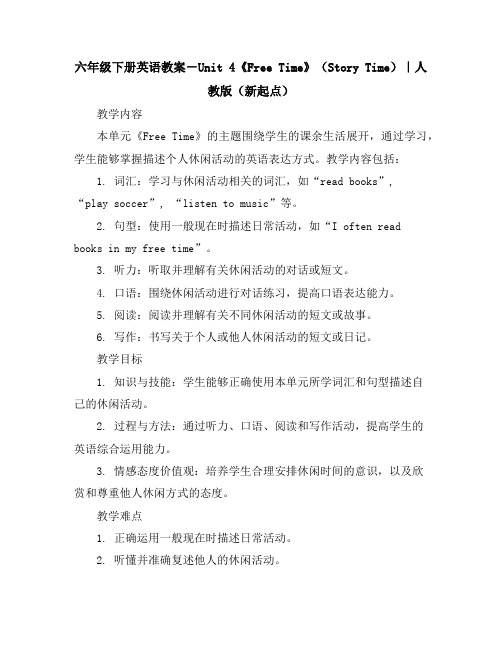
六年级下册英语教案-Unit 4《Free Time》(Story Time)|人教版(新起点)教学内容本单元《Free Time》的主题围绕学生的课余生活展开,通过学习,学生能够掌握描述个人休闲活动的英语表达方式。
教学内容包括:1. 词汇:学习与休闲活动相关的词汇,如“read books”,“play soccer”, “listen to music”等。
2. 句型:使用一般现在时描述日常活动,如“I often read books in my free time”。
3. 听力:听取并理解有关休闲活动的对话或短文。
4. 口语:围绕休闲活动进行对话练习,提高口语表达能力。
5. 阅读:阅读并理解有关不同休闲活动的短文或故事。
6. 写作:书写关于个人或他人休闲活动的短文或日记。
教学目标1. 知识与技能:学生能够正确使用本单元所学词汇和句型描述自己的休闲活动。
2. 过程与方法:通过听力、口语、阅读和写作活动,提高学生的英语综合运用能力。
3. 情感态度价值观:培养学生合理安排休闲时间的意识,以及欣赏和尊重他人休闲方式的态度。
教学难点1. 正确运用一般现在时描述日常活动。
2. 听懂并准确复述他人的休闲活动。
3. 书写关于休闲活动的短文,保持语法正确和内容连贯。
教具学具准备1. 多媒体教学设备:用于播放听力材料和展示教学内容。
2. 词汇卡片:用于词汇学习和复习。
3. 情境图或角色扮演道具:用于口语练习和角色扮演活动。
教学过程1. 导入:通过讨论学生的休闲活动,引入本课主题。
2. 词汇学习:利用词汇卡片学习新词汇,并进行相关练习。
3. 句型练习:通过听力材料和情景模拟,练习使用句型描述休闲活动。
4. 口语活动:进行小组讨论或角色扮演,模拟真实场景进行口语交流。
5. 阅读理解:阅读关于休闲活动的短文,并进行相关理解性练习。
6. 写作练习:指导学生书写关于个人休闲活动的短文,并进行同伴互评。
板书设计板书将突出本课的关键词汇、句型以及语法点,并以图表或流程图的形式展示教学内容和活动步骤。
人教(PEP)六年级英语下册Unit 4 Then and now (课件)

One day, I’m going to visit the moon.
(将来)某一天,总有一天 Past? Now?
Future? (将来)
One day, I’m going to
…
plan
Can you make sentences? 你会造句吗?
One day, I’m going to…
One day, I’m going to
…
plan
The Americans took about five days to get there in to1o9k6:9. take的过去式 V.花费 about 大约,大概
get there 到达那里
• 1969年7月21日,美国的“阿波罗11号” 宇宙飞船载着三名宇航员成功登上月球, 美国宇航员尼尔·阿姆斯特朗在踏上月球表 面这一历史时刻时,曾道出了一句被后人 奉为经典的话——这只是我一个人的一小 步,但却是整个人类的一大步。
go cycling ice-skate
play badminton think
你能说出下面短语的过去式吗?
go cycling
went cycling
play badminton
played badminton
think
thought
is
was
can
could
summer winter
autumn spring
dining hall
餐厅,食堂
What can we do in the dining hall ? have lunch
单词竞赛(3分钟速
library 记) grass
cinema
- 1、下载文档前请自行甄别文档内容的完整性,平台不提供额外的编辑、内容补充、找答案等附加服务。
- 2、"仅部分预览"的文档,不可在线预览部分如存在完整性等问题,可反馈申请退款(可完整预览的文档不适用该条件!)。
- 3、如文档侵犯您的权益,请联系客服反馈,我们会尽快为您处理(人工客服工作时间:9:00-18:30)。
小学六年级下册unit4
Class_________ Name_________ NO._____
Mark________
听力部分
一、 Listen and circle. 〔听录音. 将符合录音内容的图
片序号画上圈〕 10%
1. A B
2. A B
3.
A B
4. A B
5. A B
二、 Listen and tick or cross. 〔听录音.判断下列图片是
否与录音内容相符.如相符.在括号内打√.不相符的打Χ〕
10%
1. 〔 〕
2. 〔 〕
3.〔 〕
4.
〔 〕 5.〔 〕
三、Listen and fill in the missing words. 〔听录音.填入所缺单
词.每空一词〕
10%
1. What __________ he like? He ___________ singing.
2. What’s your ____________? I like ________________ stamps.
3. _____________ she teach English?
No, she _______________. She ________________ us math.
4. I have a pen _____________. He _____________ ____________ the violin.
四、Listen and choose the best answer. 〔听对话.并回答所提的问题〕10%
〔〕 1. A. Yes, she does. B. Yes, she is.
C. No, she isn’t.
〔〕 2. A. He likes drawing. B. Her hobby is swimming. C. He is a doctor.
〔〕3. A. I like diving. B. No, he doesn’t.
C. He likes diving.
〔〕 4. A. Yes, I am. B. Yes, she is.
C. Yes, he is.
〔〕5. A. No, she watches TV at night. B. No, she lives in Shanghai.
C. No, she goes to bed at 10:00.
五、Listen and tick or cross. 〔听录音.判断对错.〕〔10
分〕
〔〕1. Alice is Li Hua’s pen pal.
〔〕2. Li Hua is an American girl.
〔〕3. Li Hua’s mother works in a hospital.
〔〕4. Li Hua likes playing football.
〔〕5. Li Hua is a boy.
笔试部分
六、Fill in the missing words. 〔选择填空.每空一词〕10% goes, buy, fly, making, climb, live, swimming, on, dive, riding, singing, flying, likes, works, by
I am Liu Yun. I _________ in China. I like ____________, _____________ and ____________ my bike. I have a new friend. She is Alice. She ___________ ____________ model〔模型〕ships and ______________ kites. Her father ____________ in a school. He is a teacher. He ________________ to work _____________ bus.
七、Look at the pictures and answer the questions. 〔仔细看每幅图.回答下列问题〕10%
1. What is your bro ther’s hobby?
______________________________ 〔1〕〔2〕
2. Does he like skating?
______________________________
3. What does your father like? 〔3〕〔4〕
______________________________
4. What can you do?
______________________________
5. How does your father go to work? 〔5〕
______________________________
八、〔完成对话.使对话完整、通顺〕10%
A: ______________________________, Tom?
B: I like swimming. _________________________________?
A: I like singing. _________________________________? B: Yes, my mother is a teacher.
A: ______________________________________?
B: No, she teaches English.
A:_______________________________________?
B: She likes listening to music
九、〔阅读理解〕10%
The word sandwich is an English word . Sandwich was an Englishman . He lived 200 years ago 〔以前〕. Sandwich had lots of money . He was very rich〔富有〕.
But he liked playing cards 〔玩扑克〕for money . He often played all day and all night . One time , he played twenty-four hours and d idn’t stop . He didn’t leave〔离开〕the card table to eat . He asked his servant〔服务员〕to bring〔带来〕him some meat and some bread . He did not want to stop playing while he ate . He put the meat between 〔在…中间〕two pieces of bread . In this way , he could go on playing cards . From the name of this man , Sandwich , we have the word “sandwich ” today .
〔〕1. Sandwich was _________ before〔以前〕.
A. English food
B. an English car
C. an Englishman
〔〕2. Sandwich __________ played cards .
A. sometimes
B. never
C. often
〔〕3. He eats ____________.
A. at the card table
B. in a restaurant
C. in a park
〔〕4. He played cards __________ .
A. day and night
B. all day
C. all night
〔〕5. Sandwich is the name of __________ today .
A. a man
B. food
C. drink
十、〔英文作文〕10%
假如你叫Jack, 现在住在中国.你的爱好是游泳、玩
电脑和踢足球.周末经常和朋友一起踢足球.你有一个新笔友叫Mike. 现在请你写封电子邮件把自己的个人情况。
